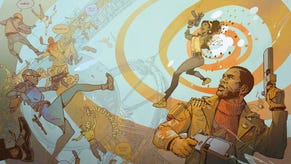Deathloop review - not Arkane's most surprising game, but possibly its best
All-rounder.
Following a year of console exclusivity to the PlayStation 5, Arkane's outstanding Deathloop arrives on Xbox Series S/X today and it'll be hitting Game Pass to boot. There are some minor tweaks and changes, including all the accessibility options added over the last year as well as a new extended ending, but beyond that it's the same brilliant game, so here's our review of the original, first published in September 2021, to let you know a little more.
Deathloop is about killing the people who are killing time. Set in an alternate 1970s that feels more like the far future of Dishonored's Gristol than part of Earth's history, it's a freeform, first-person mix of shooting, assassination, hacking and sorcery in which you wind and rewind a single day both to experiment with tools and manipulate targets such that you can massacre them all before darkness falls.
The lead is Colt Vahn, a hulking amnesiac who - shortly after being hacked to death by a mysterious woman - wakes on a time-locked Arctic island overrun by a hedonistic Bond movie organisation called AEON. To undo the rippling Anomaly keeping the island's never-ending murder-party in motion, Colt must slay the eight "Visionaries" who preside over four, separately loading areas, which also involves digging into the island's buried secrets, slaughtering no end of rank-and-file "Eternalists", and unravelling the riddle of his own presence. Amongst the Visionaries is Julianna, the aforesaid mystery lady, incorrigible nuisance-caller and the game's second playable character, who stars in a multiplayer mode where you invade the worlds of other Colts and kill them for unlocks.
What follows is a stylish, bloodthirsty and considerate reworking of ideas from Arkane's other games, which clears away a little of Dishonored's haughty perfectionism and grants you ample leeway to run amok. This is captured by the art direction, which retains Dishonored's brooding, salt-soaked shorelines but covers them with neon signboards, boutique low-poly statues and jaunty Space Age cabins - an upper cruster's carnival with heady overtones of Tarantino and Wolfenstein, perched atop the ruins of a much less forgiving game. I'm not sure it's Arkane's most adventurous or surprising work - for all the louder presentation, it sometimes pulls its punches. But it might be Arkane's most straightforwardly enjoyable game.
To begin with, Deathloop just feels like Dishonored with guns and gadgets pilfered from Q's workshop. Among the first tools the bleary-eyed Colt gets his hands on are a wireless hackamajig for use against security sensors and automated turrets, and a fancy bomb that can be morphed into a tripwire, a landmine or a grenade. You could play through the entire game with just these devices, mining chokepoints and creatively rearranging the defences. But you'll have much more fun if you make use of Slabs, magical abilities plucked from the cooling bodies of the Visionaries.
Shift is Deathloop's version of Blink, the short-ranged teleport that propelled Arkane to stardom back in 2012. It's still an absolute showstopper, elegantly abbreviating the process of creeping and flanking, and providing easy access to the island's many rooftops, towers and subterranean facilities. As superpowers go, it's rivalled only by Nexus, aka Dishonored 2's Domino, which links adversaries such that what happens to one happens to all. Unlike with Domino there's no hard limit on the number of Nexus connections, allowing you to silence a heaving dancefloor with a single bullet. Or you could launch all those dancers into the ceiling with Karnesis, the Deathloop spin on Dishonored's Pull ability. Pairing mods sparks any number of possibilities: you could deploy Shift with Aether, aka near-invisibility, to become a perfect ghost, or Karnesis with Havoc, aka berserker mode, to become Darth Vader storming hallways singlehanded. The guns, meanwhile, come in familiar shades but are a treat to wield, thanks not least to some nuanced rumble feedback. Arkane Lyon co-developed Wolfenstein: Youngblood, and you can see that experience in the gleam and heft of Deathloop's firearms, which range from thundering handcannons and pneumatic nailguns to drum-fed shotguns that look like weaponised carousel projectors.
Probably Deathloop's biggest disappointment is that all the Slabs have precedents in Dishonored. You could also argue that it doesn't steal enough: some of the Outsider's weirder gifts have been left on the table, like conjuring up spectral assassins or transforming yourself into rats and fish. But what Deathloop lacks in terms of individual tools, it makes up for in terms of freedom to use them. Your power bar recharges, for starters, so you can wield all those intoxicating skills without scraping around for elixirs. You also have more license to screw up thanks to Colt's Reprise slab, a Tracer-style rewinding skill which essentially gives you three stabs at each level before the entire day resets.
These tweaks are the mark of a gentler, more playful game, structured to reward improvisation and investigation rather than lock you into the story, which is here conveyed more through backstory documents and charismatically written dialogue than cutscenes. It's not so much an improvement on Arkane's other sims as a change of tune. The Dishonored games insist on a suspenseful friction between breadth of options and severity of consequences: yes, you can dream up killing methods beyond the designers' wildest nightmares, but the soul of a city hangs on your conduct, and while you can replay levels in search of more elegant or inventive solutions, you can't (pre-patching, anyway) fire up any level and mess around as you please. Deathloop, by contrast, is a devil-may-care holiday album of places, periods and layouts that only synchs up into a linear campaign when you want it to. In theory you're at the mercy of the clock, but the time of day only advances when you move between areas, and if you're in a rush, you can always hit fast-forward in the mission lobby.
Deathloop's setting doesn't reset completely between deaths. Certain key developments persist. The first is Colt's expanding memory of events, with things like mission objectives and passwords conveniently preserved on your inventory screen (there's an autofill option when using keypads, a vital shortcut in a game with dozens of codes to learn). Once you've killed a particular Visionary and harvested their research, you can also retain weapons, Slabs and trinkets - aka smaller upgrades such as faster aiming or exploding projectiles - between runs by infusing them with "Residium" energy gathered from objects in the world. These objects are plentiful, and you can always obtain Residium by recycling items between forays, so amassing an arsenal is much easier than in the average roguelike. I almost never found myself visiting areas simply to scrounge for guns and materials.
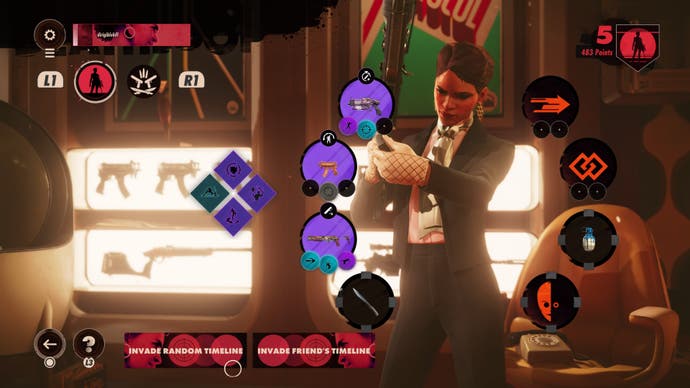
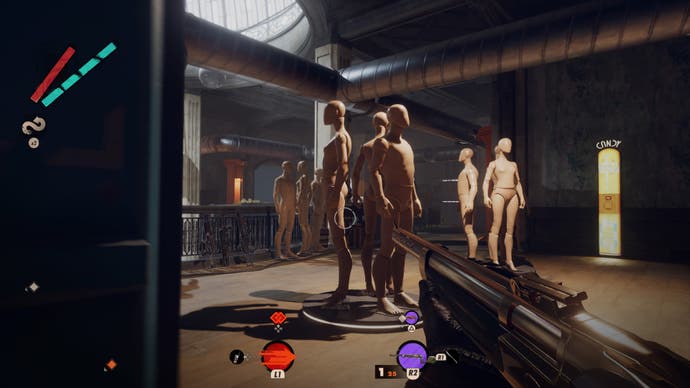
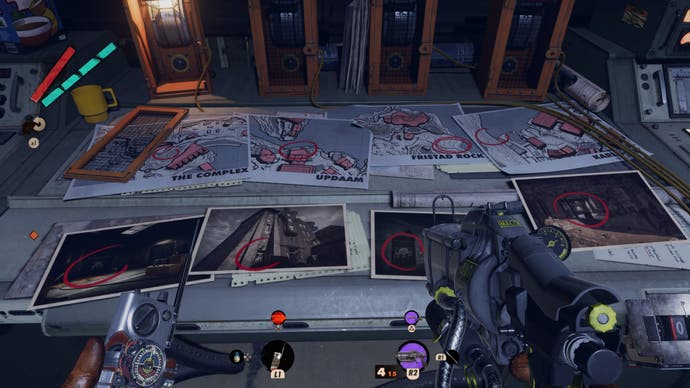
Slab mods, meanwhile, are obtained by killing the Slab's owner over and over - a brilliant incentive to revisit times and places and improvise afresh using powers and insight gained from the previous murder. It does away with the tedium of XP grinding, while simultaneously spotlighting the DIY ethos for which Arkane is famous. The mods themselves again recall Dishonored, but that doesn't make them any less entertaining. Employ the Shift Slab's self-explanatory Swapper mod to leave a trail of disoriented people in your wake, moving them into the paths of their own grenades, or leaving them to screech confusedly on windowsills. Or you can mod Nexus such that the effect spreads between characters as they pass each other - as stern a lesson on the importance of social distancing as any.
There are two halves to Deathloop's story. In the first, you kill the Visionaries one by one and obtain their powers, infiltrating and mastering the eccentricities of lairs that range from Punchdrunk-style live action shooting courses to sprawling castle masquerades. In the second, you exploit your foreknowledge of events and access to hidden locations to bring everybody together, perhaps messing up one Visionary's morning so that they decide to come along to the evening gala. The game's lore and mission menus are startlingly intuitive, given the complexity of all this - there's a daisy chain of clues and leads you can ponder, but all you really need are the brief directions you're given when you select an area.
The Visionaries and Eternalists themselves are an army of clown-painted mayflies who can be slaughtered over and over without penalty and remorse. They're also a bunch of extremely inebriated people with minimal training, which helps explain away AI shortcomings like everybody charging heedlessly into your sights, and leads to some amusing combat chatter. "Hey, it's that one guy!" one woman slurs a second before you land on her machete first. "Fine, I guess I'll cover myself then," complains one man to his shredded brethren as you circle round his position. It's often worth stopping to watch the Eternalists go about their business, whether they're getting loaded in the bars or taking advantage of their "amortality" to kill each other for kicks. While exploring one roof in Updaan, the island's social hub, I stumbled on a woman industriously setting up a line of cereal boxes so as to drop a landmine on somebody's head.
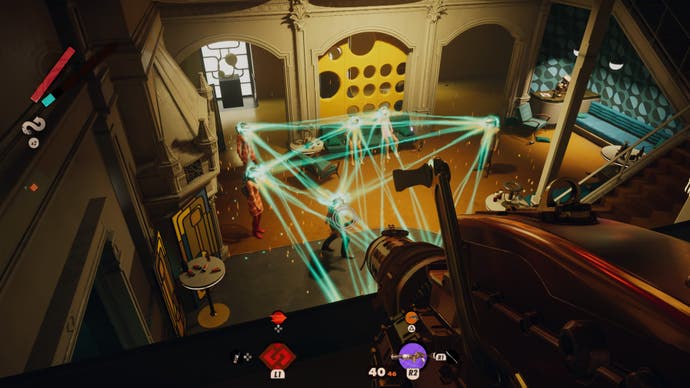
Like Hitman - whose influence is also traceable in the modular campaign structure and certain setpiece environment kills - Deathloop's writing and characterisation take square aim at what The Great Gatsby called the "vast carelessness" of the super-rich. The Visionaries range from elite scientists to ogreish rockstars and pampered artistes. They resemble classic Bond villains at first, but the dialogue channels that more contemporary blend of sociopathy that sees billionaires trying to reboot humanity on Mars while claiming that we all live in the Matrix. While Deathloop stands out among blockbuster shooters for featuring two Black leads, the social divisions it explores are less about race or for that matter gender or sexual orientation, more about the reality-altering force of hideous quantities of cash. The Visionaries are a diverse bunch, but at the end of the day, they are all one and the same concentration of impossible wealth.
For all this, it's possible to view your targets with a certain pity. AEON's disciples might think they've shucked off mortality, but their refuge is a purgatory that's all foreplay without release. One thing you learn early is that only a tiny handful, including Colt and Julianna, retain any awareness of the fact that they've been reliving their "First Day" for a while. The majority are caught on the threshold of immortality. They will never know anything beyond anticipation (and hangovers, in many cases - if you're entering a time-loop, it's best not to party too hard the night before). There are scientists who will never build on their breakthroughs, and creatives who will never finish their masterworks. There are characters who are caught forever in abusive relationships, and randos doomed to perform one and the same odd-job for eternity. Julianna and one other individual aside, the only person in a position to actually enjoy the timeloop is Colt. So why, as she continually asks you over the radio, are you in such a hurry to leave?
I'd have liked Deathloop to take a few more cues from Hitman. There are hints of social stealth - the suggestion that you can obtain a disguise to access that evening party incognito, for example - but it doesn't bloom into a full-on mingle 'em up. The Eternalists always know you're coming, which means that they always behave like guards rather than civilians, and as Julianna warns you early on, everybody recognises Colt's trademark leather jacket. It feels like a slight missed opportunity. Given that this is an online game, I'd also have liked to see something like Hitman's Contracts mode, which let you assign a target and killing method for other players to master.
"This might be Arkane's most straightforwardly enjoyable game yet."
In place of that you get Julianna's side of the game, which recalls Assassin's Creed's long-forgotten PvP multiplayer. Where Colt has his rewind ability, Julianna's Slab lets her swap faces and outfits with any NPC, leaving a clone of herself strolling around while she play-acts as cannon fodder. In practice, I've found that a lot of Juliannas just run towards the loudest noise firing a shotgun, but given an appropriately methodical opponent, Deathloop sings as a cat-and-mouse game. Julianna seals all the map's exits when she invades, obliging Colt to hack a radio tower to escape. As the invader, the obvious approach is to surround the tower with tripwires and landmines, but you might also sic the Eternalist mob on Colt with the D-pad, or lay ambushes along the obvious routes to make your opponent's map knowledge a disadvantage. If all this sounds like a chore, you can always turn off the online, though this means that you'll only get to fight an AI-controlled Julianna once in the game. There's also a limit to how often any given Julianna player can invade you to stop high-level griefers ruining the experience for greener Colts.
Appropriately for a game about time travel, Deathloop can be read as a game both for newcomers and old hands - an accessible introduction to Arkane's grittier immersive sims, or a triumphant refinement of the Dishonored style. Where it feels most like a concluding act is in how it builds on a theme in Arkane's work about games as means of both coercion and liberation, trapping you in order to empower and motivate you to break out of them, forever challenging you to think of some possibility that has escaped the developer's calculations, to the point of sabotaging the illusion entirely. I've argued in the past that this contradiction is fundamental to the immersive sim genre, but Arkane is unique in making it a question of story and setting. We see this in the opening and closing moments of 2017's Prey, in Dishonored 2's Clockwork Mansion and in the studio's penchant for villains who are domineering game designers in all but name. And we see it in Deathloop, which takes that curious inside/outside thinking and applies it to Time itself.






